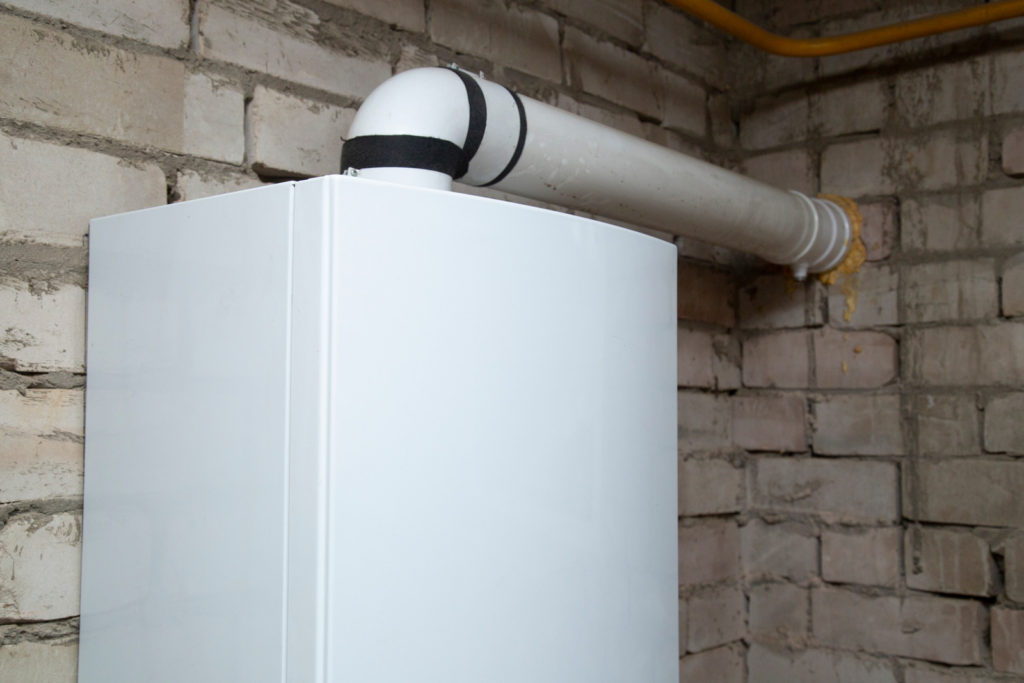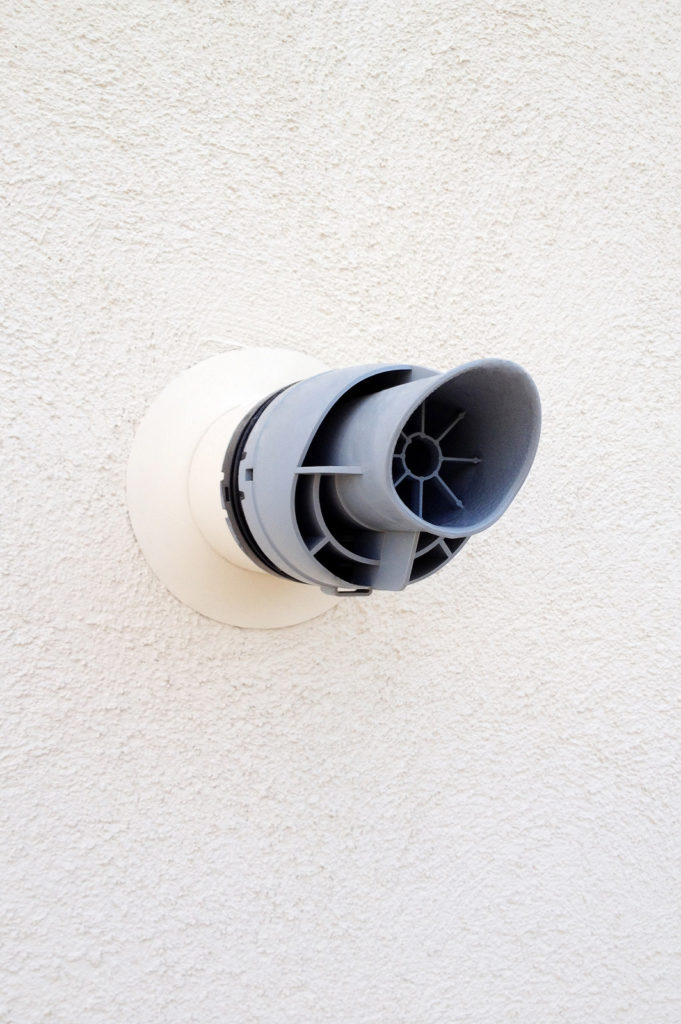What is a boiler flue?
A boiler flue is a pipe or duct that carries away air and waste fumes produced by the boiler as it burns fuels such as gas and oil. It is like an exhaust for the appliance and is a vitally important part of the boiler and heating system which safely removes carbon monoxide and carbon dioxide – products of combustion that a system produces as its heating water, away to the outside atmosphere. It is dangerous when the boiler flue becomes blocked.
What can block the boiler flue?
Common causes of flue blockages include accumulated debris like soot, dirt, or leaves, which can restrict the exhaust flow. Ice buildup during freezing weather may also obstruct the flue. Additionally, bird nests or small animals seeking shelter can clog the flue, preventing the safe discharge of combustion byproducts.
Signs of a blocked boiler flue
Signs of a blocked flue include noisy boiler operation, staining around the pipe, water leaks, strange smells like fumes, and triggered carbon monoxide alarms. Preventative measures like proper installation, sealing, and using a guard can help avoid flue blockages and ensure the safety of your family.
A blocked boiler flue is a serious health hazard, posing the risk of carbon monoxide poisoning and potential death.

Boiler flue blocked: What to do
It’s important to take blocked boiler flues seriously, as they can be a serious health and safety hazard. Carbon monoxide poisoning is a real risk when a boiler flue is blocked, and it can lead to serious health problems or even death. Therefore, if you suspect that your boiler flue is blocked, it’s important to take action immediately.
You should turn off your boiler and call a Gas Safe registered engineer to inspect your heating system. Do not attempt to unblock the inside of the flue yourself, as this can be dangerous. By recognising the symptoms of a blocked boiler flue and taking prompt action, you can ensure the safety of yourself and your family.

What comes out of a boiler flue?
When a boiler and its flue are working properly and the system is burning gas correctly, it is mostly carbon dioxide and water vapour that is produced and expelled. When a boiler isn’t functioning properly for whatever reason, carbon monoxide can be produced, which is potentially fatal.
How to tell if your boiler flue is blocked
A blocked flue can have any of the following signs:
- A noisy boiler. Because the system isn’t able to function properly, it puts strain on some boiler components so they have to work harder and this can make a boiler noisier than usual, with possibly heavy sounds.
- Staining or sooting around the pipe and its seals. A working flue should not have any stains or sooting on it or around it.
- Water leaks around the boiler or mouth of the flue pipe. If air and steam cannot be carried away fully, you may notice water around where the flue exits the boiler or even underneath it.
- Strange smell. You may notice an unusual smell around the boiler because the exhaust fumes are trapped and then come into the room.
- Carbon monoxide alarm is triggered. If you have an alarm in the same room as the boiler, it may be triggered because of combustion gases build-up.
Do not ignore any of these signs. A blocked flue pipe can trap harmful gases in the boiler and if they can’t be removed to outside, will enter the home and be breathed in by occupants.
Boiler Replacement: Tips To Help You Choose A New Boiler
Blocked boiler flue symptoms
Blocked boiler flues can cause several symptoms that residents should be aware of to ensure their safety. One of the most common symptoms is the smell of gas or fumes, which can be a sign that the flue is blocked and the gases produced by the boiler are not being properly vented outside.
Another symptom is the presence of soot or staining around the boiler or flue system, which can be caused by a build-up of carbon monoxide. Additionally, if you notice that your boiler is not working properly or that your gas bills have increased unexpectedly, this could be a sign of a blocked flue.

How to clear a blocked boiler flue
If you find the flue is blocked, make sure to turn off the boiler. Don’t have it running while you start unblocking the flue. Because most debris enters from the outside part of the flue pipe, at the terminal, you should check here and remove easy to get to debris.
Only a gas safe registered engineer will be able to open the combustion chamber of the boiler and check from inside and remove any blockage from there.
Consider taking out a care plan so your boiler is covered for emergencies and breakdowns throughout the year. Hometree offers customers peace of mind with home care packages for your boiler, central heating, plumbing, drains and home electrics all at an affordable monthly or annual cost. Click here to find out more:
What to do if you have a blockage in the boiler flue
In the event the flue is blocked, turn off the boiler straight away. It is better to stop the gas supply to the boiler entirely but if you’re not sure how to do this, simply switch it off. Ventilate the property as much as possible and call a gas safe engineer to inspect the boiler inside and out.
How to stop boiler flues from getting blocked
Install the flue correctly
The first thing is to ensure the flue has been installed in the correct position. There are specific requirements for their location and a heating engineer should be familiar with them. Specifically keeping the termination at an adequate distance from guttering and soil and down pipes etc will help.
Check the boiler is sealed correctly
The main requirement is for boiler flues to be sealed both inside and outside to weatherproof the termination so weather and/or combustion fumes don’t reenter the property. This can be achieved with a sand and cement mixture. Some installers will also use special silicone type materials.
The flue also has to be fitted securely so it can’t be disconnected and pulled away from the boiler from the outside.
Fit a guard over the termination
Fitting a guard over the terminal will help prevent leaves and twigs from entering and blocking the flue. Check the flue pipe for damage regularly as prevention is always better than cure.
Fumes from neighbours flue
Fumes from a neighbour’s boiler flue can be a cause for concern, as they can pose a health and safety risk to you and your family. If you notice fumes coming from your neighbour’s boiler flue, it’s important to take action immediately.
A condensing boiler will produce steam from its terminal, especially in winter and there are regulations in place to ensure the nuisance to neighbours from this is minimised by being some distance away from the boundary. However, fumes from a blocked boiler flue will be different from water vapour.
The fumes could be a sign that the flue is blocked or damaged, which can cause dangerous gases like carbon monoxide to leak into your home. Carbon monoxide is a colourless, odourless gas that can cause headaches, nausea, dizziness, and even death in high concentrations.
To address fumes from a neighbour’s boiler flue, you should first try to speak to your neighbour about the issue. They may not be aware that their boiler is causing fumes to enter your property, and they may be willing to take action to fix the problem.
If your neighbour is unresponsive or unwilling to take action, you should contact your local council’s environmental health department or the Gas Safe Register for advice. They can help you identify the source of the fumes and take steps to ensure that they are eliminated. By addressing fumes from a neighbour’s boiler flue, you can ensure the safety and wellbeing of yourself and your family.
